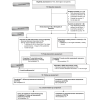Internet-Based Audiologist-Guided Cognitive Behavioral Therapy for Tinnitus: Randomized Controlled Trial
- PMID: 35156936
- PMCID: PMC8887633
- DOI: 10.2196/27584
Internet-Based Audiologist-Guided Cognitive Behavioral Therapy for Tinnitus: Randomized Controlled Trial
Abstract
Background: Tinnitus is a symptom that can be very distressing owing to hearing sounds not related to any external sound source. Managing tinnitus is notoriously difficult, and access to evidence-based care is limited. Cognitive behavioral therapy (CBT) is a tinnitus management strategy with the most evidence of effectiveness but is rarely offered to those distressed by tinnitus. The provision of internet-based CBT for tinnitus overcomes accessibility barriers; however, it is not currently readily available in the United States.
Objective: The aim of this study is to investigate the efficacy of internet-based CBT compared with that of weekly monitoring for the management of tinnitus in reducing tinnitus distress; reducing tinnitus-related comorbidities, including tinnitus cognitions, insomnia, anxiety, and depression; and assessing the stability of the intervention effects 2 months after the intervention.
Methods: A 2-arm randomized clinical trial comparing audiologist-guided internet-based CBT (n=79) to a weekly monitoring group (n=79) with a 2-month follow-up assessed the efficacy of internet-based CBT. Eligible participants included adults seeking help for tinnitus. Recruitment was conducted on the web using an open-access website. Participants were randomized via 1:1 allocation, but blinding was not possible. The study was undertaken by English or Spanish speakers on the web. The primary outcome was a change in tinnitus distress as measured using the Tinnitus Functional Index. Secondary outcome measures included anxiety, depression, insomnia, tinnitus cognition, hearing-related difficulties, and quality of life.
Results: Internet-based CBT led to a greater reduction in tinnitus distress (mean 36.57, SD 22) compared with that in weekly monitoring (mean 46.31, SD 20.63; effect size: Cohen d=0.46, 95% CI 0.14-0.77) using an intention-to-treat analysis. For the secondary outcomes, there was a greater reduction in negative tinnitus cognition and insomnia. The results remained stable over the 2-month follow-up period. No important adverse events were observed. Further, 16% (10/158) of participants withdrew, with low overall compliance rates for questionnaire completion of 72.3% (107/148) at T1, 61% (91/148) at T2, and 42% (62/148) at T3.
Conclusions: This study is the first to evaluate and indicate the efficacy of audiologist-delivered internet-based CBT in reducing tinnitus distress in a US population. It was also the first study to offer internet-based CBT in Spanish to accommodate the large Hispanic population in the United States. The results have been encouraging, and further work is indicated in view of making such an intervention applicable to a wider population. Further work is required to improve compliance and attract more Spanish speakers.
Trial registration: ClinicalTrials.gov NCT04004260; https://clinicaltrials.gov/ct2/show/NCT04004260.
Keywords: cognitive behavioral therapy; eHealth; internet intervention; randomized controlled trial; teleaudiology; telehealth; tinnitus; web-based intervention.
©Eldré W Beukes, Gerhard Andersson, Marc Fagelson, Vinaya Manchaiah. Originally published in the Journal of Medical Internet Research (https://www.jmir.org), 14.02.2022.
Conflict of interest statement
Conflicts of Interest: None declared.
Figures





Similar articles
-
Audiologist-Guided Internet-Based Cognitive Behavior Therapy for Adults With Tinnitus in the United Kingdom: A Randomized Controlled Trial.Ear Hear. 2018 May/Jun;39(3):423-433. doi: 10.1097/AUD.0000000000000505. Ear Hear. 2018. PMID: 29095725 Clinical Trial.
-
Internet-Based Intervention for Tinnitus: Outcome of a Single-Group Open Trial.J Am Acad Audiol. 2017 Apr;28(4):340-351. doi: 10.3766/jaaa.16055. J Am Acad Audiol. 2017. PMID: 28418328
-
Effectiveness of Guided Internet-Based Cognitive Behavioral Therapy vs Face-to-Face Clinical Care for Treatment of Tinnitus: A Randomized Clinical Trial.JAMA Otolaryngol Head Neck Surg. 2018 Dec 1;144(12):1126-1133. doi: 10.1001/jamaoto.2018.2238. JAMA Otolaryngol Head Neck Surg. 2018. PMID: 30286238 Free PMC article. Clinical Trial.
-
Psychological Therapy for People with Tinnitus: A Scoping Review of Treatment Components.Ear Hear. 2017 Mar/Apr;38(2):149-158. doi: 10.1097/AUD.0000000000000363. Ear Hear. 2017. PMID: 27541331 Free PMC article.
-
Do the effects of internet-delivered cognitive-behavioral therapy (i-CBT) last after a year and beyond? A meta-analysis of 154 randomized controlled trials (RCTs).Clin Psychol Rev. 2024 Dec;114:102518. doi: 10.1016/j.cpr.2024.102518. Epub 2024 Nov 16. Clin Psychol Rev. 2024. PMID: 39579466 Free PMC article. Review.
Cited by
-
Advances in Tinnitus and Hearing Disorders.Brain Sci. 2025 May 23;15(6):553. doi: 10.3390/brainsci15060553. Brain Sci. 2025. PMID: 40563724 Free PMC article.
-
Medication Use Reported by Individuals With Tinnitus Who Are Seeking Internet-Based Psychological Interventions.Am J Audiol. 2021 Dec 9;30(4):1088-1095. doi: 10.1044/2021_AJA-21-00062. Epub 2021 Oct 27. Am J Audiol. 2021. PMID: 34706212 Free PMC article.
-
Development and Psychometric Validation of Tinnitus Qualities and Impact Questionnaire.Clin Pract. 2025 Apr 27;15(5):87. doi: 10.3390/clinpract15050087. Clin Pract. 2025. PMID: 40422268 Free PMC article.
-
Internet-delivered cognitive behavioral therapy for tinnitus compared to Internet-delivered mindfulness for tinnitus: a study protocol of a randomized controlled trial.Trials. 2023 Apr 12;24(1):269. doi: 10.1186/s13063-023-07299-9. Trials. 2023. PMID: 37046290 Free PMC article.
-
The Current State of Evidence Regarding Audiologist-Provided Cognitive Behavioural Therapy for the Management of Tinnitus: A Scoping Review.Audiol Res. 2024 Apr 30;14(3):412-431. doi: 10.3390/audiolres14030035. Audiol Res. 2024. PMID: 38804459 Free PMC article.
References
-
- Clarke NA, Henshaw H, Akeroyd MA, Adams B, Hoare DJ. Associations between subjective tinnitus and cognitive performance: systematic review and meta-analyses. Trends Hear. 2020;24:1–23. doi: 10.1177/2331216520918416. https://journals.sagepub.com/doi/10.1177/2331216520918416?url_ver=Z39.88... - DOI - DOI - PMC - PubMed
-
- Watts EJ, Fackrell K, Smith S, Sheldrake J, Haider H, Hoare DJ. Why is tinnitus a problem? A qualitative analysis of problems reported by tinnitus patients. Trends Hear. 2018;22:1–10. doi: 10.1177/2331216518812250. https://journals.sagepub.com/doi/10.1177/2331216518812250?url_ver=Z39.88... - DOI - DOI - PMC - PubMed
-
- Salazar JW, Meisel K, Smith ER, Quiggle A, McCoy DB, Amans MR. Depression in patients with tinnitus: a systematic review. Otolaryngol Head Neck Surg. 2019 Jul;161(1):28–35. doi: 10.1177/0194599819835178. http://europepmc.org/abstract/MED/30909841 - DOI - PMC - PubMed

